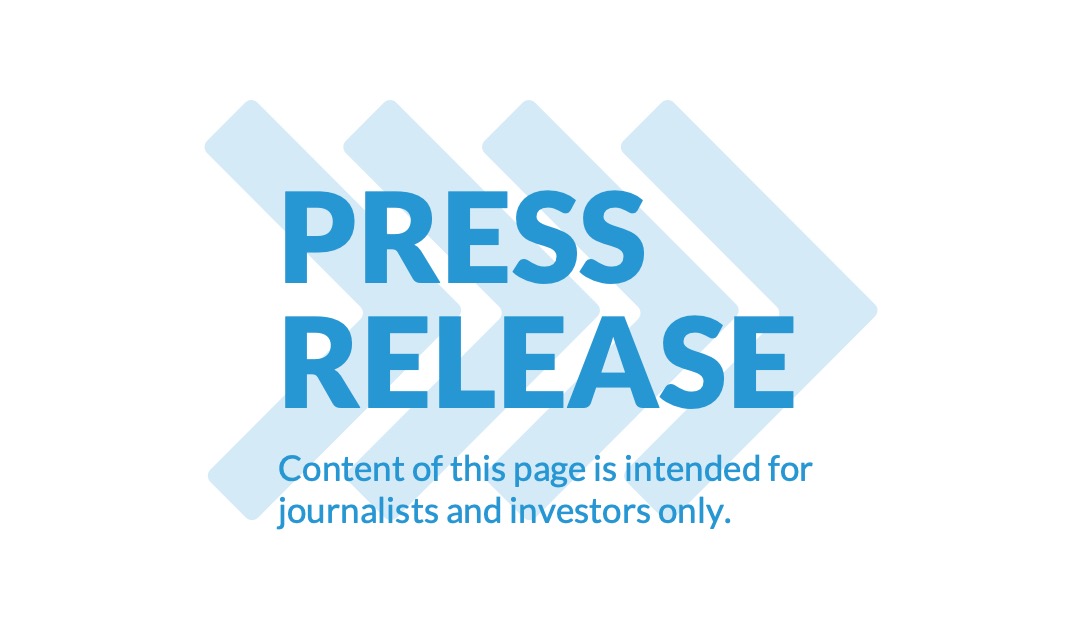Ipsen demonstrates commitment to innovation in neuroscience at 12th World Congress for Neurorehabilitation (WCNR)
PARIS, FRANCE, 14th December 2022 – Ipsen (Euronext: IPN; ADR: IPSEY) today announced a robust presence at the 12th World Congress for Neurorehabilitation (WCNR) in Vienna, Austria and virtually, from 14-17 December, further demonstrating the company’s long-standing partnership with the World Federation for Neurorehabilitation (WFNR) and ongoing commitment to neuroscience.
In addition to showcasing the company’s latest neuroscience clinical data, Ipsen will host a prime-time satellite symposium entitled “About time: Optimising Long-Term Outcomes for Patients Treated with Botulinum Toxin”. Facilitated by global neuroscience experts Dr. Jorge Jacinto, Dr. Klemens Fheodoroff and Dr. Alberto Esquenazi, the session will center on new clinical data and around Ipsen’s patient-centric approach to educational training and the importance of focusing on long-term outcomes for patients treated with a botulinum toxin.
Data presented at WCNR 2022 includes:
- A Phase IV, Prospective, Observational, Multicenter Study Evaluating the Effectiveness and Safety of abobotulinumtoxinA in Pediatric Lower Limb Spasticity (PLLS).
- A study exploring abobotulinumtoxinA efficacy and safety in children with upper limb spasticity previously treated with botulinum toxin.
- A study examining the change in Leg Activity Measure (LegA) sensitivity following treatment of lower limb spasticity with a single cycle of abobotulinumtoxinA in an ambulant population.
- Single centre, prospective, observational study methodology to assess the use of GripAble, a rehabilitation device, on patients with upper limb spasticity (ULS) receiving botulinum toxin A (BoNT-A).
- Baseline data from the AboLiSh study, exploring the most frequently injected muscles in patients undergoing treatment with abobotulinumtoxinA for lower limb spasticity in routine practice.
- The detrimental impact of the COVID-19 pandemic on the management of post-stroke spasticity in England.
Continuing to advance neuroscience and neurotoxin research
With over 25 years of experience in neurotoxins, neuroscience innovation remains central to the company’s future. Key data from Ipsen’s research and development program reinforcing the company’s commitment to improving health outcomes for patients living with debilitating neurological disorders will be showcased at this year’s WCNR. Clinical updates include a focus on the need to ensure treatment for spasticity is individualized, assessment of the impact of treatment with Dysport® (abobotulinumtoxinA) in pediatric and adult spasticity and a review of the impact of COVID-19 on stroke admissions and interventions in the UK.
“The breadth of data being presented at the congress demonstrates our commitment to continued scientific innovation in neuroscience as well our focus on looking at patient care holistically to add value beyond our treatments. This aligns to our broader company strategy of thinking more holistically about how patients experience healthcare – not just how they experience a medicine – to advance neuroscience,” commented Steven Hildemann, Executive Vice President and Chief Medical Officer, Ipsen.
Committed to improving health outcomes
WCNR 2022 also marks the 10th anniversary of Ipsen’s Ixcellence Network®, an educational program raising the standards of care for patients living with debilitating neurological disorders.
Since its launch, Ipsen has established 10 Ixcellence expert centers in Europe and Latin America, with nearly 800 physicians benefitting from the program so far and improving the standard of care for thousands of patients with spasticity from around the world with its best-in-class injector training.
Hamzah Baig, Vice President, Global Medical Affairs, Neuroscience, Ipsen, said: “With comprehensive and wide-ranging cutting-edge content, including use of advanced guidance techniques and implementation of multi-disciplinary care, the Ixcellence Network® is the only program of its kind to have articles published in peer-reviewed journals; it is the gold-standard for advanced training in treating cervical dystonia and focal spasticity.”
As part of their commitment to physician education, Ipsen will be delivering an interactive educational training session at this year’s WCNR, tailored around the management of complex patient cases.
About Spasticity
Spasticity is a condition in which there is an abnormal increase in muscle tone or stiffness in one or more muscles, which might interfere with movement. Spasticity is usually caused by damage to nerve pathways in the brain or spinal cord that control muscle movement, and may occur in association with cerebral palsy, spinal cord injury, multiple sclerosis, stroke, and brain or head trauma. In adults, approximately one in three stroke patients, one in three patients with spinal cord injury, one in six patients with traumatic brain injury, and two in three patients with MS will develop lower limb spasticity.
About Dysport
Dysport® (abobotulinumtoxinA) is an injectable form of a botulinum neurotoxin type A (BoNT-A) product, which is a substance derived from Clostridium bacteria producing BoNT-A that inhibits the effective transmission of nerve impulses and thereby reduces muscular contractions. It is supplied as a lyophilized powder. AbobotulinumtoxinA has marketing authorization in more than 90 countries, more than 30 years of clinical experience and 6 million treatment years of patient experience.
The detailed recommendations for the use of Dysport are described in the Summary of Product Characteristics (SmPC) for Dysport (300 units) Powder and Dysport (500 units) Powder.
NOTE: Dysport® labels and approved indications may vary from country to country.
Ipsen
Ipsen is a global mid-sized biopharmaceutical company focused on transformative medicines in Oncology, Rare Disease and Neuroscience. With Specialty Care sales of €2.6bn in FY 2021, Ipsen sells medicines in over 100 countries. Alongside its external-innovation strategy, the company’s research and development efforts are focused on its innovative and differentiated technological platforms located in the heart of leading biotechnological and life-science hubs: Paris-Saclay, France; Oxford, U.K.; Cambridge, U.S.; Shanghai, China. Ipsen has around 5,000 colleagues worldwide and is listed in Paris (Euronext: IPN) and in the U.S. through a Sponsored Level I American Depositary Receipt program (ADR: IPSEY). For more information, visit ipsen.com
| CONTACTS: Media |
|
| Charlotte Davies Global Head of Franchise Communications, Neuroscience +44 (0)7514 728359 |
Ioana Piscociu Senior Manager, Global Media Relations +33 6 69 09 12 96 |
|
Investors |
|
| Craig Marks Vice President, Investor Relations +44 7584 349 193 |
Adrien Dupin de Saint-Cyr Investor Relations Manager +33 6 64 26 17 49 |
Forward-looking statements
The forward-looking statements, objectives and targets contained herein are based on Ipsen’s management strategy, current views and assumptions. Such statements involve known and unknown risks and uncertainties that may cause actual results, performance or events to differ materially from those anticipated herein. All of the above risks could affect Ipsen’s future ability to achieve its financial targets, which were set assuming reasonable macroeconomic conditions based on the information available today. Use of the words ‘believes’, ‘anticipates’ and ‘expects’ and similar expressions are intended to identify forward-looking statements, including Ipsen’s expectations regarding future events, including regulatory filings and determinations. Moreover, the targets described in this document were prepared without taking into account external growth assumptions and potential future acquisitions, which may alter these parameters. These objectives are based on data and assumptions regarded as reasonable by Ipsen. These targets depend on conditions or facts likely to happen in the future, and not exclusively on historical data. Actual results may depart significantly from these targets given the occurrence of certain risks and uncertainties, notably the fact that a promising medicine in early development phase or clinical trial may end up never being launched on the market or reaching its commercial targets, notably for regulatory or competition reasons. Ipsen must face or might face competition from generic medicine that might translate into a loss of market share. Furthermore, the research and development process involves several stages, each of which involves the substantial risk that Ipsen may fail to achieve its objectives and be forced to abandon its efforts with regards to a medicine in which it has invested significant sums. Therefore, Ipsen cannot be certain that favorable results obtained during preclinical trials will be confirmed subsequently during clinical trials, or that the results of clinical trials will be sufficient to demonstrate the safe and effective nature of the medicine concerned. There can be no guarantees a medicine will receive the necessary regulatory approvals or that the medicine will prove to be commercially successful. If underlying assumptions prove inaccurate or risks or uncertainties materialize, actual results may differ materially from those set forth in the forward-looking statements. Other risks and uncertainties include but are not limited to, general industry conditions and competition; general economic factors, including interest rate and currency exchange rate fluctuations; the impact of pharmaceutical industry regulation and healthcare legislation; global trends toward healthcare cost containment; technological advances, new medicine and patents attained by competitors; challenges inherent in new-medicine development, including obtaining regulatory approval; Ipsen’s ability to accurately predict future market conditions; manufacturing difficulties or delays; financial instability of international economies and sovereign risk; dependence on the effectiveness of Ipsen’s patents and other protections for innovative medicines; and the exposure to litigation, including patent litigation, and/or regulatory actions. Ipsen also depends on third parties to develop and market some of its medicines which could potentially generate substantial royalties; these partners could behave in such ways which could cause damage to Ipsen’s activities and financial results. Ipsen cannot be certain that its partners will fulfil their obligations. It might be unable to obtain any benefit from those agreements. A default by any of Ipsen’s partners could generate lower revenues than expected. Such situations could have a negative impact on Ipsen’s business, financial position or performance. Ipsen expressly disclaims any obligation or undertaking to update or revise any forward-looking statements, targets or estimates contained in this press release to reflect any change in events, conditions, assumptions or circumstances on which any such statements are based, unless so required by applicable law. Ipsen’s business is subject to the risk factors outlined in its registration documents filed with the French Autorité des Marchés Financiers. The risks and uncertainties set out are not exhaustive and the reader is advised to refer to Ipsen’s 2021 Universal Registration Document, available on ipsen.com
Attachment


